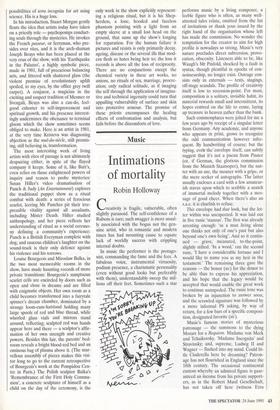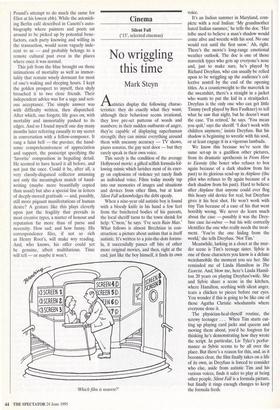Music
Intimations of mortality
Robin Holloway
Creativity is fragile, vulnerable, often slightly paranoid. The self-confidence of a Rubens is rare; such swagger is more usual- ly associated with the bogus not the gen- uine artist, who in romantic and modern times has had mounting cause to equate lack of worldly success with crippling internal doubts.
In music the performer is the protago- nist, commanding the fame and the fees. A fabulous voice, instrumental virtuosity, podium presence, a charismatic personality (even without good looks but preferably with them), understandably sweep the mil- lions off their feet. Sometimes such a star performs music by a living composer, a feeble figure who is often, as many well- attested tales relate, omitted from the list of invitations or thank yous issued by the right hand of the organisation whose left has made the commission. No wonder the temptation for the creator to aim for high profile is nowadays so strong. Music's very nature precludes direct subversion, provo- cation, obscenity. Listeners able to be, like Waugh's Mr Pinfold, shocked by a fault in syntax, though plentiful in epochs of con- noisseurship, no longer exist. Outrage con- sists only in externals — texts, stagings, off-stage scandals. The profile of creativity itself is low to recession-point. For most, composition is a solitary, invisible habit, its material rewards small and intermittent, its hopes centred on the life to come, laying up treasure in heaven rather than the bank.
Such commonplaces were jolted foi me a few years ago by receipt of a singular letter from Germany. Any academic, and anyone who appears in print, grows to recognize the odd communication however infre- quent. By handwriting of course; but the typing, eve.* the envelope itself, can subtly suggest that it's not a paean from Pinner (or, if German, the glorious commission from the Munich Staatsoper), but the nut- ter with an axe, the moaner with a gripe, or the mere seeker of autographs. The latter usually encloses a card with a few amateur- ish staves upon which to scribble a snatch of immortal melody together with a mes- sage of good cheer. When there's also an s.a.e. it is churlish to refuse.
This envelope had that look, but the let- ter within was unexpected. It was laid out in five runic 'stanzas'. The first was already arresting enough: 'as a man living alone one thinks not only of one's past but also beyond one's own being'. And so it contin- ued — grave, measured, to-the-point, slightly stilted. 'In a word,' ran the second rune, 'I have a considerable fortune and I would like to name you as my heir in the testament.' The remaining three gave the reasons — the honor (sic) for the donor to be able thus to express his appreciation, and his hope that the legacy would be accepted that would enable the great work to continue unimpeded. The runic tone was broken by an injunction to answer soon, and the scrawled signature was followed by a more informal PS asking, by way of return, for a few bars of a specific composi- tion, designated favorite (sic).
Music's famous stories of mysterious patronage — the summons to the dying Mozart for a Requiem. Madame von Meck and Tchaikovsky, 'Madame Incognita' and Stravinsky; and, supreme, Ludwig II and Wagner — flashed into my mind. Could lit- tle Cinderella here be dreaming? Patron- age has not flourished in England since the 18th century. The occasional continental custom whereby an admired figure is guar- anteed an income from his private support- ers, as in the Robert Musil Gesellschaft, has not taken off here (witness Ezra Pound's attempt to do much the same for Eliot at his lowest ebb). While the astonish- ing Berlin café described in Canetti's auto- biography where painters and poets sat around to be picked up by potential bene- factors, each party knowing and willing in the transaction, would seem vaguely inde- cent to us — and probably belongs to a remote cultural past even in the places where once it was normal.
This jolt from the blue brought on those intimations of mortality as well as immor- tality that remain wisely dormant for most of one's waking and sleeping hours. I kept the golden prospect to myself, then shyly broached it to two close friends. Their independent advice was for a sage and seri- ous acceptance. The simple answer was with difficulty written, then dispatched. After which, one forgets; life goes on, with mortality and immortality pushed to its edges. And so I found myself one day many months later referring casually to my secret in conversation with a fellow-composer. It rang a faint bell — the gravitas, the hand- some comprehensiveness of appreciation and support, the postscript specifying the `favorite' composition in beguiling detail. He seemed to have heard it all before, and not just the once. Could it be, after all, a very classily-disguised collector amassing not only the meaningless snatch of hand- writing (maybe more beautifully copied than usual) but also a special line in letters of deeply-moved gratitude — and, possibly, still more piquant manifestations of human desire? A gesture like this plays cleverly upon just the fragility that prevails in most creative types, a matter of honour and reputation far more than of purse and necessity. How sad; and how funny. His correspondence files, if not so rich as Henry Root's, will make wry reading. And, who knows, his offer could yet be genuine, albeit multifarious. Time will tell — or maybe it won't.



























































 Previous page
Previous page